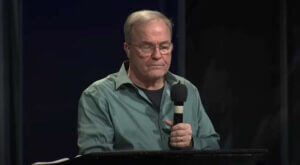“But this is a people robbed and despoiled; they are all snared in holes, and they are hidden in prison houses; they are for a prey, and no one delivers, for a spoil, and no one says, ‘Restore them'” (Isa. 42:22).
The First Step Act represents a significant opportunity to embrace a more Biblical approach to justice and restoration in our federal system. The bill would reduce disparities in some drug-related sentences, ease mandatory sentencing requirements, increase “good-time credits” and incentivize inmates to take part in vocational and rehabilitation programs that improve their chances of successful reintegrating into society.
Here are three key biblical principles I believe are supported by the act:
1. Surround yourself by what is good. Just as hospitals are the worst places for sick people to get well because they’re brimming with disease, so prisons may be the worst place for prisoners to reform because they’re brimming with evil and violence. The National Institute of Justice reports that “prison can exacerbate, not reduce, recidivism. Prisons themselves may be schools for learning to commit crimes.”
“Do not be unequally yoked together with unbelievers. For what fellowship has righteousness with unrighteousness? What communion has light with darkness?” (2 Cor. 6:14).
“Whatever things are true, whatever things are honest, whatever things are just, whatever things are pure, whatever things are lovely, whatever things are of good report, if there is any virtue, and if there is any praise, think on these things” (Phil. 4:8).
2. Consider the heart. Greater flexibility in sentencing allows judges to consider context in an accused’s case.
“The Lord sees not as man sees. For man looks on the outward appearance, but the Lord looks on the heart” (1 Sam. 16:7b).
3. Maintain hope for redemption. From a Christian worldview, justice should leave space for restoration for those who decide to seek it.
“[The LORD] is patient with us, because He does not want any to perish, but all to come to repentance” (2 Pet. 3:9).
It is easier to be tough on crime when you’ve never been justice-involved or known someone who is. Over the course of my life, I have had the opportunity to know several people who have been justly and unjustly incarcerated. I’ve grown a heart for their stories, and with that a deep desire for them to know the Lord and be able to fulfill the purpose for which they were created. The First Step Act is, as its name suggests, a positive initial step in that direction.
“For the Lord hears the poor and does not despise His prisoners” (Ps. 69:33).
Nanette Kirsch is a survivor of abuse, and the author of Denial: Abuse, Addiction and a Life Derailed, a book that shares the true story of 1 of the 1,000 victims in the Pennsylvania grand jury report. Nanette is a wife, a mother of four, businesswoman and author who lives in Raleigh, North Carolina (DenialBook.com).
See an error in this article?
To contact us or to submit an article



















